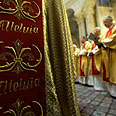
Illustration
צילום: איי אף פי
Did Pope save the Jews?
Op-ed: Mass murder of Jews was apparently not on Pope Pius XII’s list of priorities
Pope Pius XII, the reigning pontiff during the Holocaust, won’t go away. What he did or did not do about the Nazi extermination of Jews has been the subject of debate since the war ended. Now, according to new research by William Doino, a writer for “Inside the Vatican” magazine, the most controversial Pope in modern history helped a group of 500 Italian Jewish refugees escape death at the hands of the Nazis.
The new research might spur Pope Benedict XVI to elevate Pius XII to sainthood, as the Roman Catholic Church has been trying to do for many years. We already know that hundreds of Jews found refuge in Rome’s convents and the in Vatican itself. We are also familiar with the individual acts of heroism of some Catholics who saved Jews across Europe.
The debate has been framed in terms of absolutes: Pius’ critics see him as the epitome of evil; his supporters insist he was a savior of Jews. Pope Pius XII was not “Hitler’s Pope” of British historian John Cornwell nor the “Righteous Gentile” ridiculously evoked by Rabbi David Dallin. More simply, the industrial mass murder of Jews was not on the Pope’s list of priorities.
The same could be said of Stalin, Roosevelt and Churchill, but they did not claim to be the “Vicar of Christ.” The apologists exonerate Pius XII by saying that he did not understand the meaning of the Holocaust. They are wrong. The Pope knew everything about the Shoah. As brave historian Daniel Goldhagen wrote, "It is not that Pius XII did not understand but that he understood only too well."
Pius was given daily briefings of Nazi atrocities by the British envoy to the Holy See. The pontiff resisted calls from Roosevelt’s representative to the Holy See, the president of the Polish government in exile, the bishop of Berlin, and the chief rabbi of Palestine to speak out specifically and forcefully on behalf of the Jews.
Moral blindness
The Pope could have done much to stop the Zyklon B gas. He did little or nothing. How many Roman Catholic SS men and Nazi functionaries would have had, at the very least, second thoughts about their work had the Pope, for example, ordered Vatican Radio to broadcast round-the-clock denunciation of the Shoah, condemning it ex cathedra, and excommunicating the perpetrators? And how many Jews hearing such broadcasts from the voice of the Vatican would have learned that “resettlement” was a euphemism for death by gas?
In a landmark 1950 article for Commentary, historian Leon Poliakov wrote: “It is painful to have to state that at the time when gas chambers and crematoria were operating day and night, the high spiritual authority did not find it necessary to make a clear and solemn protest that would have echoed through the world”.
In a letter to Bishop von Preysing of Berlin on April 30, 1943 referring to the extermination of the Jews, the Pope concluded his thoughts with, “Unhappily in the present state of affairs, we can bring no help other than our prayers.” The Jews didn’t need prayers, but heroic resistance from the Christian bystanders.
The Pope refused to publish what has now become known as the “hidden encyclical.” In June 1938, more than a year before the outbreak of World War II, Pope Pius XI commissioned a draft papal statement attacking anti-Semitism called “Humani Generis Unitas” (“The Unity of the Human Race.”) He died before it was completed. Pius XII buried it until it was published in France in 1995.
Had Pius XII published the document it might have saved hundreds of thousands, or millions, of Jews. The Catholic Church and relief organizations were suffering from the moral blindness induced by centuries of Christian “teaching of contempt,” in which the Jews were demonized as “deicides”, “moral lepers” and “agents of the devil” for their refusal to accept Christianity.
That’s why Pius XII did intervene only on behalf of baptized Jews, as they were considered by the Church as Catholics. The Church believed Jews to be evil and harmful; it did not object in principle to their punishment and it lacked empathy for them.
The Pope apparently chose cowardice in the face of overwhelming evil. That’s why our moral judgment about the most important modern event concerning Jews in the history of the Catholic Church should remain that of culpability. While millions were cannibalized and devoured in crematorium IV of Birkenau and their skin was used for lamp shades, the Pope turned a blind eye to the Israelite cataclysm. Et Papa tacet.
Giulio Meotti, a journalist with Il Foglio, is the author of the book A New Shoah: The Untold Story of Israel's Victims of Terrorism










